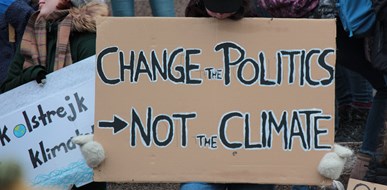Is mandatory human rights and environmental due diligence a paper tiger? Lessons from the French experience
Published 16 January 2024By Virginie Rouas

@Tania Malréchauffé via Unsplash - Friday's for future climate strike at the Helsinki Parliament in April 2019
In 2017, France became the first country to enact a due diligence law, the Law on the Duty of Vigilance, requiring large French companies to identify risks and prevent serious human rights, health and safety, and environmental harms in their supply chain. The French Vigilance Law was groundbreaking. It paved the way for the adoption of mandatory due diligence standards in Europe, culminating in the European Commission’s proposal for the Corporate Sustainability Due Diligence Directive in 2022.
However, six years after the law’s enactment, the results of its implementation and enforcement have been disappointing, and victims of business-related abuse continue to face significant challenges in holding companies accountable and obtaining justice. The French experience should serve as a cautionary tale for future mandatory due diligence legislation.
France’s Law on the Duty of Vigilance
Under the Law on the Duty of Vigilance, large French companies are required to draft and effectively implement a due diligence plan, termed the ‘vigilance plan’. This plan must include ‘reasonable due diligence’ measures to identify risks and prevent serious harm to human rights and fundamental freedoms, individual health and safety, and the environment throughout their supply chain. More specifically, the plan must cover risks and harm resulting from the activities of the company, the companies it controls, as well as subcontractors or suppliers with whom it has an established commercial relationship. The law also establishes enforcement mechanisms involving private and judicial oversight. Affected stakeholders and NGOs can give a company formal notice to comply with its due diligence obligations. If the company does not comply within three months, they may petition the court or its interim relief judge to compel compliance (Article L225-102-4(II) French Commercial Code). Finally, the law allows for a company that fails to meet its due diligence obligations to be held civilly liable for the damage that could have been avoided if these obligations had been met (Article L225-1025 French Commercial Code).
Poor implementation of the French Law
The implementation of the French Vigilance Law has run into several issues. First, it is unclear which companies are subject to the law, and the French government has not published an official list of these companies. Furthermore, there is no official monitoring of company compliance with their due diligence obligations, particularly their vigilance plans published to date. In the face of government inaction, NGOs have compiled a list of companies that appear to meet the requirements set out in the law. They found that 17% of them had failed to publish a due diligence plan. A further problem is that when companies publish a vigilance plan, the content is often vague or insufficient. This is due to several factors, including the general terms of the law, which give companies a lot of leeway, and the lack of government guidance on the content and implementation of the required vigilance plans. Companies also appear to be wary of disclosing too much information in their vigilance plans.
Procedural issues slowing down judicial enforcement
The Law on the Duty of Vigilance has resulted in at least 16 formal notices, some of which have been followed by summons to court and liability claims. Because of the Law’s broad normative scope, the claims filed thus far have covered a wide range of adverse human rights and environmental impacts including climate change, labour rights violations, deforestation, and plastic pollution.
TotalEnergies, a French multinational energy and petroleum company, was the first company to face enforcement claims in 2019 for the climate change impact of its activities, as well as human rights violations and environmental damage resulting from a mega oil project in Tanzania and Uganda. Although the Law on the Duty of Vigilance has made it possible to bring the issue of companies’ lack of vigilance to the attention of the courts, all claims have been delayed or rejected on procedural grounds to date.
The first claims brought under the Law on the Duty of Vigilance were delayed while courts debated whether civil or commercial courts were competent to hear claims based on the Law. Following two years of legal proceedings, the Court of Cassation ruled that claimants could bring claims before civil courts, and the legislator then granted the Paris Judicial Court exclusive jurisdiction.
In several cases, plaintiffs have also encountered a procedural barrier regarding the relationship between the formal notice against the company and the legal action before the Paris Judicial Court.
They ruled that any legal action based on non-compliance with the obligations imposed by the Law on the Duty of Vigilance must be preceded by a formal notice, or it will be inadmissible. As a result, the grievances stated in the formal notice must be the same as those stated in the summons. This means that the vigilance plan mentioned in both the formal notice and the summons must be the same, otherwise the legal action is deemed inadmissible (this was the case in the claims against Électricité de France and TotalEnergies). However, the Law on the Duty of Vigilance makes no explicit requirement that the formal notice and summons be related to the same vigilance plan. This requirement is problematic because the content of the vigilance plan is likely to change in between the time of the formal notice and the summons. If plaintiffs are not allowed to adapt their claims to the most recent vigilance plan, their complaints may become obsolete. To remedy this, the French judge suggested that the plaintiffs provide a new formal notice for each new vigilance plan. However, this imposes a significant procedural burden on plaintiffs.
In addition, the judge ruled that each grievance raised in the formal notice must be discussed between the parties before legal action is taken. The company must be formally warned prior to legal action, and ‘mere meetings between the parties cannot constitute a formal warning’. The judge was strict on this criterion, in particular because the Law on the Duty of Vigilance does not require a ‘discussion’ or ‘conciliation’ phase between the formal notice and the legal action.
Finally, plaintiffs must address the formal notice and summons to the exact author of the vigilance plan, even if it is unclear which company within a corporate group subject to the Law effectively drafted the plan (see the Vigie/Suez case). According to FIDH, one of the claimant NGOs in the Vigie/Suez case, ‘based on this interpretation, in the future it will be impossible for organisations to know which company to sue if the vigilance plan is not signed’.
Conclusion
The French experience demonstrates that in the absence of well-designed due diligence obligations and enforcement mechanisms, and clear procedural standards, affected rights holders will face significant hurdles when attempting to compel companies to comply with their due diligence obligations or seeking to obtain remedies. This undermines the purpose of due diligence, which is to prevent and mitigate business-related human rights and environmental abuses, rendering any mandatory due diligence initiative a paper tiger.
Learn more about the EU’s corporate sustainability due diligence revolution
Since 2019, the Asser Institute offers a week-long academy on the theory and practice of sustainability due diligence as key to responsible business conduct. Learn about the corporate sustainability due diligence process and its implementation in various European states at our spring academy on 08 – 12 April 2024. Read more.
Republished from Oxford Human Rights Blog with permission. Original blog posts available here: [Part I] [Part II]

